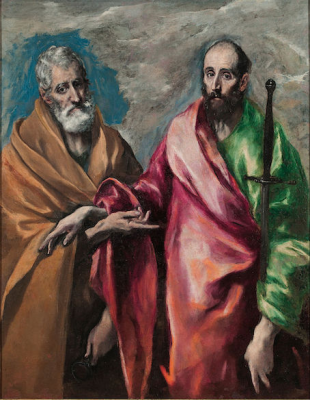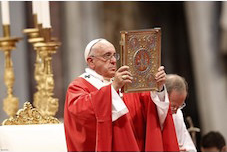Homily for Feast of St Peter and St Paul

St Peter and St Paul by El Greco. Museo Nacional d'Art de Catalunya
Today we celebrate the Feast of Saint Peter and Saint Paul, the two giants of our Christian faith.
What is beautiful about this feast, is that we celebrate them together, yet they were two very different characters. In their distinct differences and uniqueness, we celebrate their joint mammoth efforts in shaping the early church and transmitting the faith to us. They were different, yet they were one!
Yes, they were very different:
- Peter was from Galilee, in modern-day Israel. Paul was from Tarsus, in modern-day Turkey.
- Peter was a disciple of Jesus and knew Jesus personally. Paul had been a zealous Jew who persecuted Christians, before experiencing a dramatic conversion on the road to Damascus, but didn't physically spend time with Jesus.
- Peter was a fisherman by trade, while Paul was a tentmaker.
- Peter very well was unable to read, while Paul was highly educated and an extensive writer (having given us thirteen of the twenty-seven books of the New Testament). Etc….
What I find most fascinating, when looking at early Church history, is that both men also had very different views on how to build the Church. The main difference was that Saint Peter believed that for people to become followers of Christ, people first should become Jews, and then they could become Christians. Saint Paul held the opposite view and proclaimed that if we truly believe that Jesus came for everyone, then people could become Christian without first needing to become Jews first or needing to adhere to the Jewish laws.
This discussion became a real hot topic. Peter who was largely based in Jerusalem and St Paul who was on his missionary travels argued vehemently. So in order to settle the dispute, in 49 AD the Council of Jerusalem was called. The first council in our Church (the last one being Vatican II). This Council of Jerusalem is recorded in both Acts of the Apostles 15 and in the Epistle to the Galatians 2.
It makes very interesting reading. It is a bit like a football match, where say Chelsea are playing Liverpool. The same match will get accounted for in a very different way: the London-based Evening Standard will be more generous towards Chelsea, whereas say if Liverpool lost the match, the Liverpool Echo would say what a bad referee there was, how they were hard done by, etc… The same match, the same reality, yet two very different accounts.
So there are significant differences between the two accounts of the Council in the New Testament:
For example, the rationale for Paul's attendance at the council and him traveling to the council are very different: in Acts, it is accounted that Paul was 'summoned to Jerusalem' whereas in Galatians, Paul says that he went to Jerusalem to sort out the problems once and for all and that he was sent by the Christian communities he founded. He says that he is the main initiator of the meeting, not Peter.
Also, Acts describes the meeting as harmonious and pleasant; Paul describes the meeting as being far more acrimonious and dramatic.
Finally whilst both accounts concur that the final decision of the council was taken that Jewish Law was not to be imposed on Gentile converts: Acts does qualify that yet a selection of dietary, ritualistic and ceremonial customs adhered to by the Jews should be followed by all Christians. In the Epistle to the Galatians, no record of any qualification is recorded. Paul insists that the outcome to the discussions was an unequivocal acceptance of the principle that no conditions were to be imposed on new gentile members associating themselves with the Christian community.
Why am I saying all this? Even though Peter and Paul were very different and held differing views, they were ONE. United in their efforts, united in their love for Christ.
And it is something that unfortunately we often forget in our church today, where there can be so much internal infighting.
Differences of opinions, yes,
But we have to remember we must remain as one and show a united front.
Unity and Communion are at the centre of today's feast!
Both Peter and Paul were unyielding in their proclamation of the Gospel, regardless of the opposition they faced. They FEARLESSLY shared the message of salvation, even when it was met with resistance or persecution:
Our first reading talks about these brutal persecutions where we hear James being beheaded
Our second reading talk about Paul's life nearing its end, where he describes his own life as being a sacrificial drink being poured out as an offering to God.
They gave their lives fully to God… dying for their faith…. Dying for the transmission of faith … dying for us…
Saints Peter and Paul, pray for us.


















